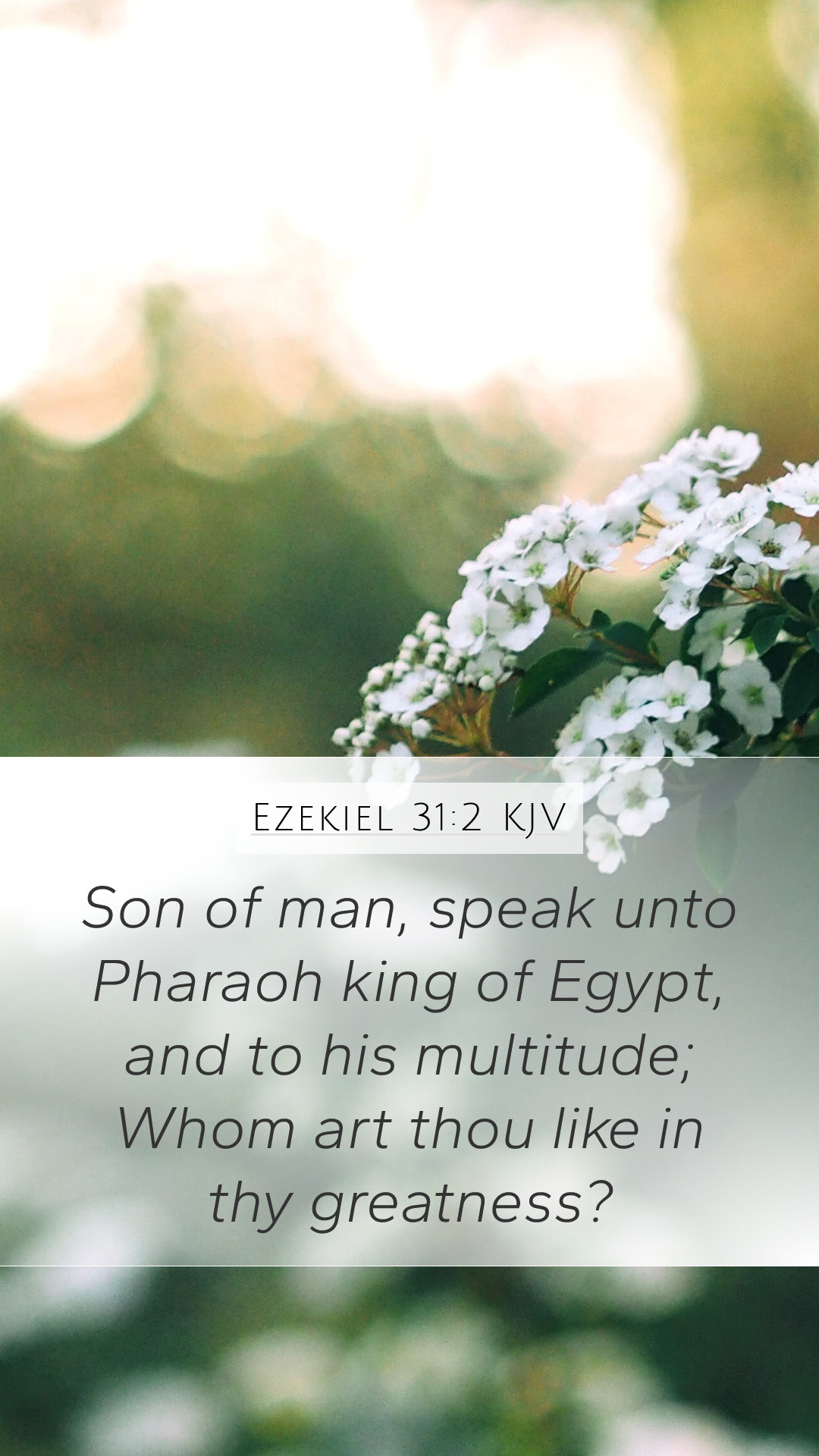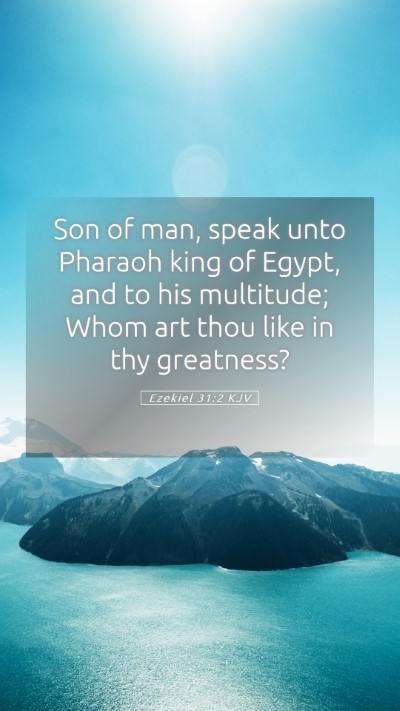Ezekiel 31:2 - Understanding the Meaning
The verse Ezekiel 31:2 states: "Son of man, say unto Pharaoh king of Egypt, and to his multitude; Whom art thou like in thy greatness?" This verse is a part of a larger prophetic message directed towards Egypt and its ruler, Pharaoh. Below, we will explore its meaning using insights from several public domain commentaries, including those by Matthew Henry, Albert Barnes, and Adam Clarke, while also highlighting its significance within the broader context of Scripture.
Contextual Background
In the book of Ezekiel, the prophet delivers messages not only to Israel but also to surrounding nations, including Egypt. Chapter 31 marks a prophecy against Egypt, comparing it to the mighty Assyria. Understanding the historical context and the relationship between these nations helps illuminate the theme of pride and downfall that permeates this passage.
Primary Themes of Ezekiel 31:2
- Comparison of Egypt to Greatness: This verse begins with the Lord commanding Ezekiel to address Pharaoh, illustrating the idea that despite Egypt's power, it can be compared to other great nations—namely Assyria.
- Pride and Consequence: As seen throughout the book, the pride of nations leads to downfall. This address serves as a warning to Egypt, which had grown arrogant in its might.
- Divine Authority Over Nations: The verse emphasizes that God has authority over all nations. By asking Pharaoh whom he is like, God challenges Pharaoh's perceived might and greatness.
Commentary Insights
To gain a deeper understanding of Ezekiel 31:2, we will summarize the interpretations of notable biblical scholars:
Matthew Henry's Commentary
Matthew Henry elaborates on this verse by noting that God confronts Pharaoh's arrogance. He emphasizes that God is setting the stage for a profound rebuke of Pharaoh's pride by showing that all earthly power is temporary. Henry highlights that God’s inquiry prompts Pharaoh to reflect on his position in comparison to greater powers, suggesting that even the mightiest will face judgment.
Albert Barnes' Commentary
Albert Barnes offers a perspective that focuses on the symbolic nature of the verse. He remarks that the greatness of Egypt is being likened to that of Assyria, which fell despite its grandeur. Barnes asserts that this analogy signals to Pharaoh that no matter how great he believes he is, he is still under the sovereignty of God, and like Assyria, he too could fall.
Adam Clarke's Commentary
Adam Clarke interprets this verse as a rhetorical question that exposes the futility of Egyptian pride. Clarke suggests that the verse serves to remind Pharaoh that, despite his apparent power, he is ultimately small in the sight of the Almighty God, who governs all nations. He emphasizes the unfolding divine plan that will lead to Egypt’s eventual downfall.
Application of the Verse
For modern readers, Ezekiel 31:2 serves as a powerful reminder of humility before God. Here are some applications:
- Recognizing Divine Power: Believers are called to acknowledge that all human achievements pale in comparison to God’s eternal sovereignty.
- Warning Against Pride: Like Pharaoh, individuals today are cautioned against pride and self-exaltation, as it can lead to downfall.
- Reflecting on Authority: Studying Scripture helps understand the roles of leaders and nations under God’s authority.
Cross References
Ezekiel 31:2 can be cross-referenced with several key biblical passages that expand on its themes:
- Ezekiel 32:1-19 - Continues the prophecy against Egypt.
- Isaiah 14:4-23 - Prophecy against the king of Babylon, showcasing similar themes of pride and judgment.
- Jeremiah 46:25-26 - Additional prophecy addressing Egypt and its downfall.
Conclusion
Ezekiel 31:2 serves as a poignant reminder of the transient nature of earthly power and the overarching sovereignty of God. It invites readers to engage in Bible study insights and Bible verse interpretations that can enhance their Bible study groups or online Bible study experiences. The rich commentary offers a range of perspectives for anyone seeking a deeper understanding of Scripture, enabling both individual and collective reflection on the nature of pride, humility, and divine authority.
Further Study Suggestions
For those wanting to delve deeper into Ezekiel 31:2 and its implications, consider exploring:
- In-depth Bible verse analysis through the lens of historical context.
- Online Bible study tools that facilitate a deeper dive into Old Testament prophetic literature.
- Discussion topics in Bible study guides that focus on the themes of power and God's authority.


